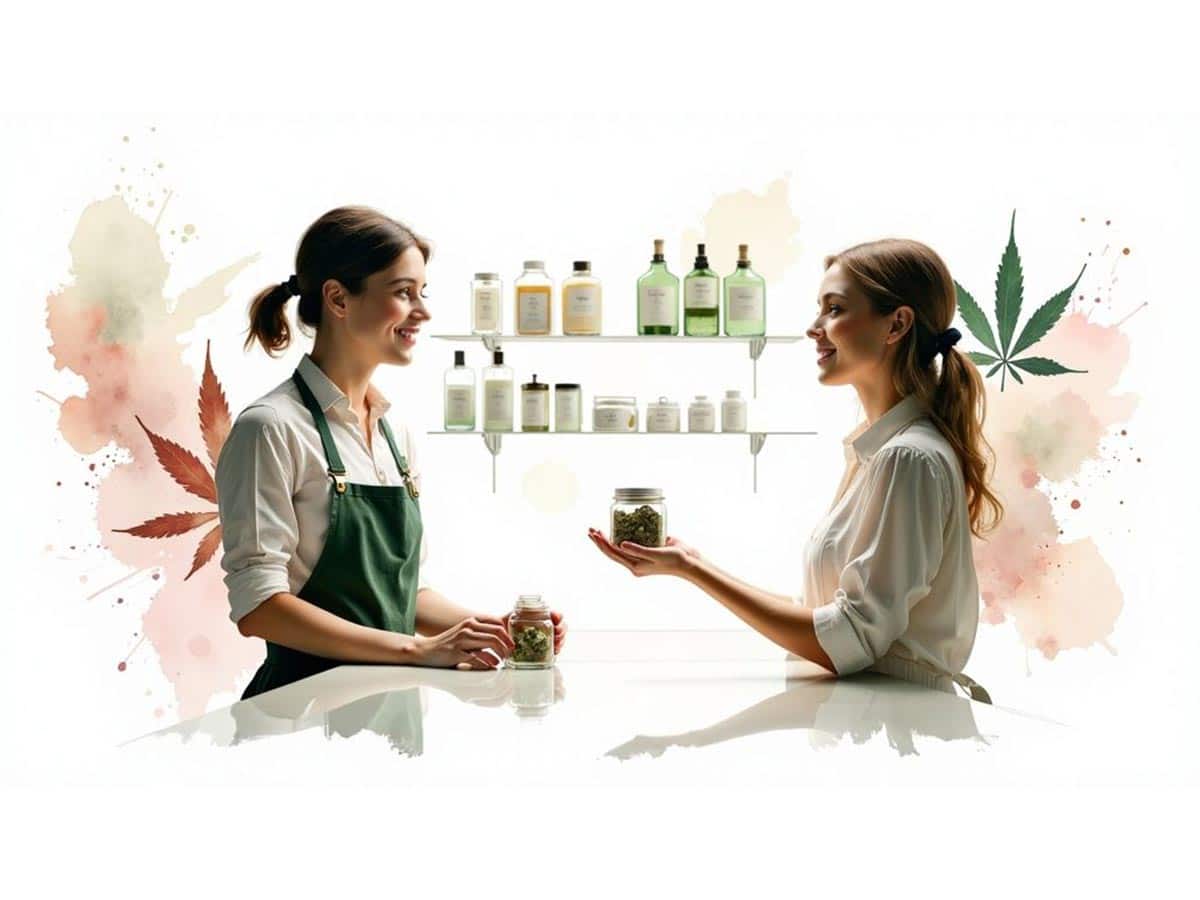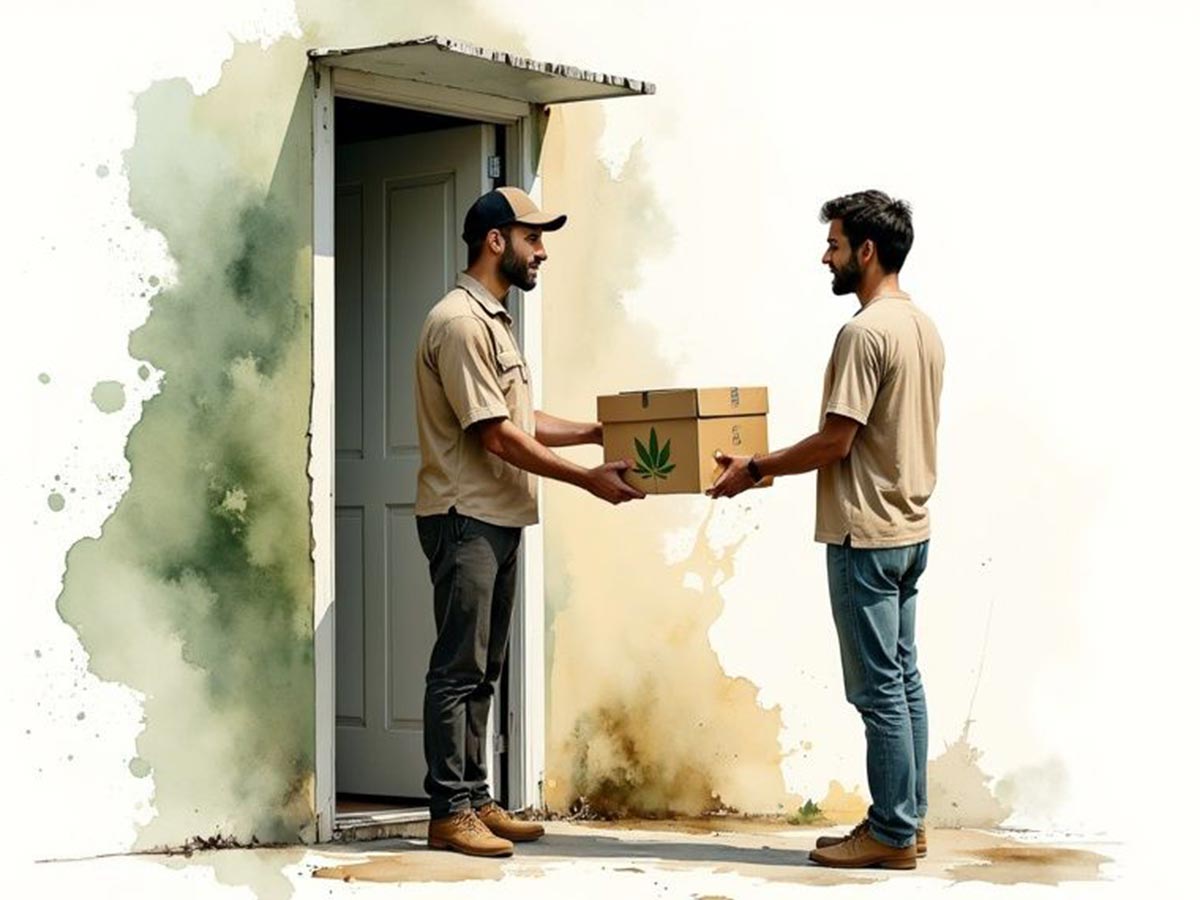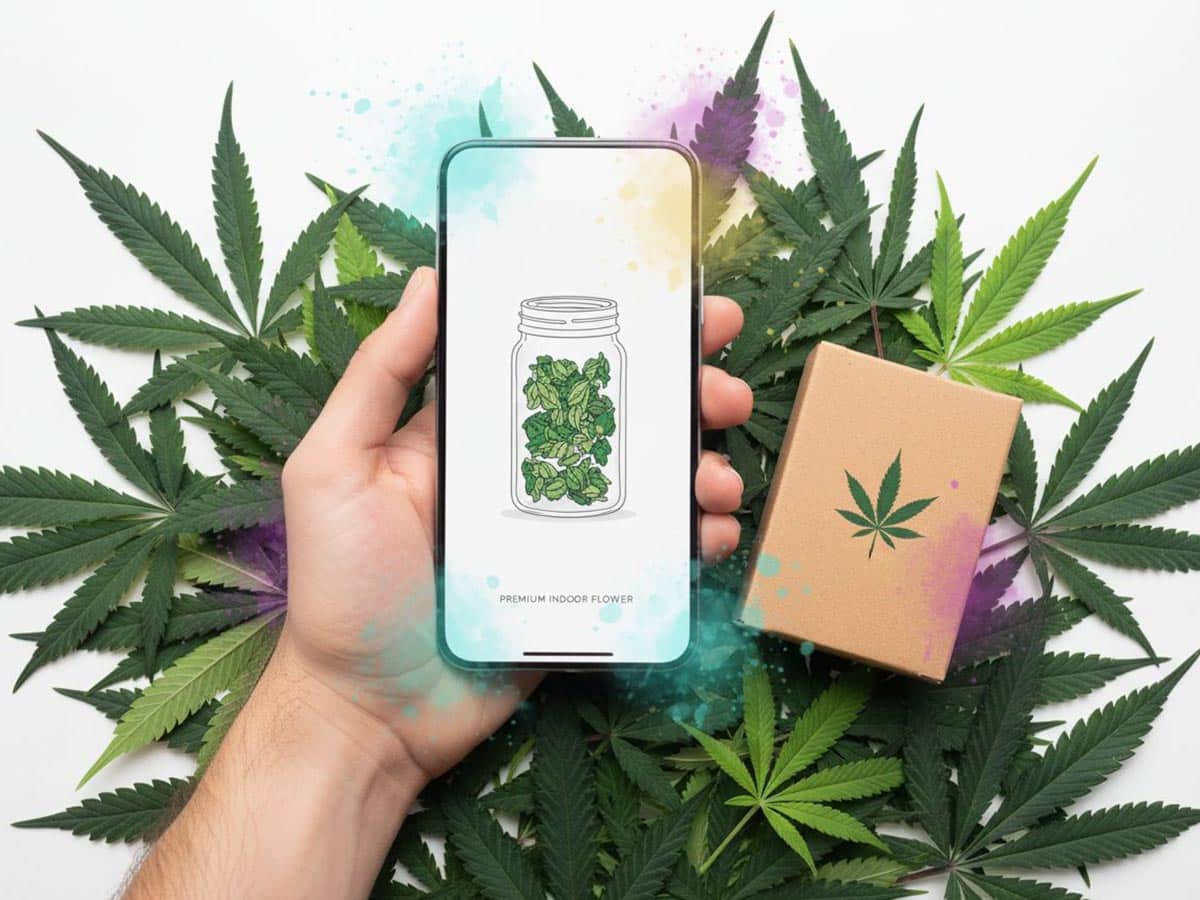Ever wondered, “What is a dispensary?” Simply put, a dispensary is a state-licensed and professionally regulated store where you can legally purchase cannabis products.
If your mind pictures a dimly lit, old-school head shop, think again. The modern dispensary experience is closer to a bright, upscale boutique or a specialized pharmacy, designed to be welcoming, safe, and educational.
A Peek Inside a Modern Dispensary
Forget what you’ve seen in movies. Today’s legal cannabis dispensaries are designed from the ground up to be safe, inviting, and genuinely helpful. Their entire purpose is to give you a secure and reliable place to learn about and purchase cannabis, whether you’re a curious first-timer or an experienced connoisseur.

Here’s a practical way to think about it: imagine visiting a specialty wine shop. A knowledgeable sommelier greets you, asks about your preferences, and guides you to the perfect bottle. That’s the exact experience a great dispensary provides. The staff, known as budtenders, are your expert guides. They’re there to answer your questions, explain the options, and help you find a product that perfectly matches your goals.
What Does a Dispensary Actually Do?
At its core, a dispensary is the essential, regulated link between legal cannabis producers and you. They aren’t just stores; they are the public face of a highly controlled industry. This model began to take shape when states like California first legalized medical cannabis back in 1996, paving the way for the sophisticated market we see today.
And that market is booming. Projections show the legal cannabis industry growing from $33.6 billion in 2023 to an estimated $45.3 billion by 2025. This explosive growth shows how quickly dispensaries have become a trusted part of mainstream retail. You can explore the data in this 2025 cannabis market analysis.
To give you a clear, actionable overview, here’s what a dispensary does for you.
Dispensary at a Glance
| Aspect | Description |
|---|---|
| Product Sales | Legally sells a wide range of state-approved cannabis products, from classic flower and edibles to advanced concentrates and topicals. |
| Education | Employs knowledgeable budtenders to help you understand different product types, dosages, and their likely effects so you can make confident choices. |
| Safety & Compliance | Adheres to strict state regulations, ensuring every product is lab-tested for purity, safety, and consistency. This is your guarantee of quality. |
| Verification | Checks government-issued IDs to confirm you are 21+ for recreational purchases or have a valid medical card, ensuring a legal and secure transaction. |
Ultimately, a dispensary’s mission is to provide a safe, legal, and informed environment for you to purchase cannabis.
Medical vs Recreational Dispensaries
So, what is a dispensary? It’s not a one-size-fits-all answer. As you explore the cannabis world, you’ll discover two distinct types: medical and recreational. While they both sell cannabis, their purpose, rules, and the experience they offer are fundamentally different.
Think of a medical dispensary as a specialized pharmacy. Its mission is to provide specific cannabis products to patients with qualifying health conditions who are seeking therapeutic relief. To enter, you need official documentation, like a state-issued medical card. The entire experience is focused on healthcare and wellness.
In contrast, a recreational dispensary (often called an “adult-use” shop) feels more like a high-end liquor store or a local craft brewery. These shops welcome any adult who is 21 or older with a valid government ID. Here, the focus is on personal enjoyment, relaxation, and exploring the vast world of cannabis products.
Key Differences at a Glance
The divide between medical and recreational goes far beyond who can walk in the door. It shapes the products on the shelves, the expertise of the staff, and even the price you pay at the register.
This infographic breaks down the core distinctions, giving you a clear, actionable comparison based on documentation, purchase intent, and product variety.
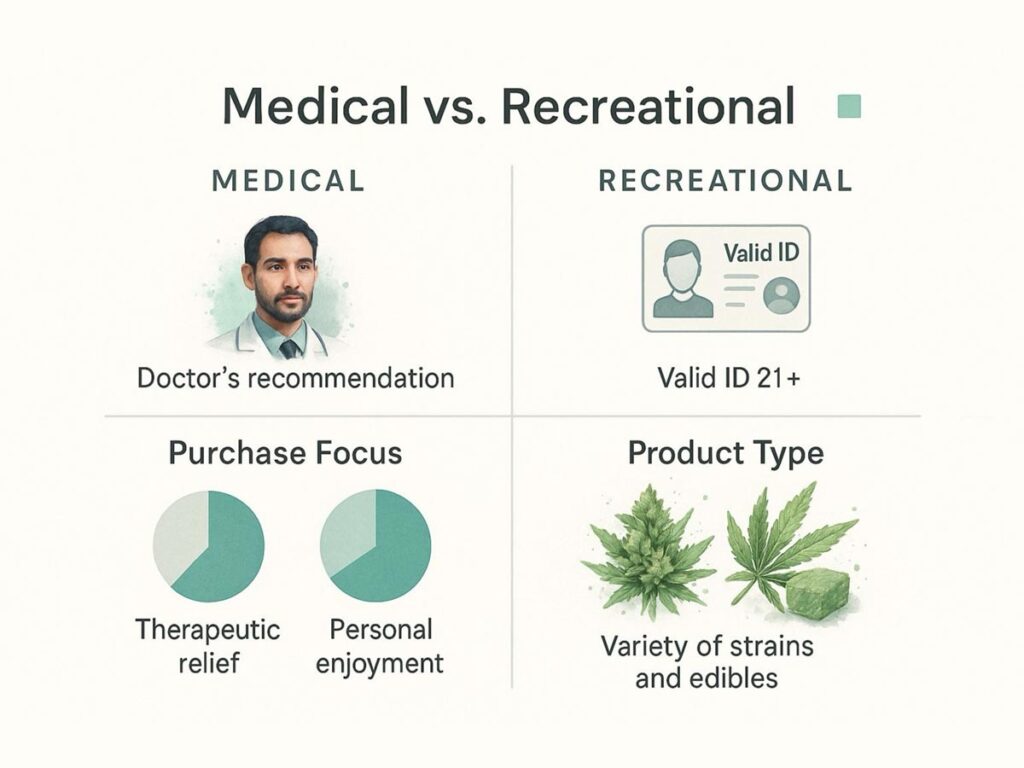
As you can see, the dispensary’s business model is built around its core mission—whether it’s providing targeted medical relief or catering to general adult enjoyment.
Medical Dispensaries: A Healthcare Access Point
Medical dispensaries operate firmly within the wellness and healthcare sector. They serve as a crucial access point for patients seeking cannabinoid-based options, often as a complement to traditional medical treatments. This isn’t a small niche; the global medical cannabis industry is projected to hit an incredible USD 21.5 billion by 2025. These facilities are more than just retail stores; they are highly regulated centers operating under strict government oversight. You can explore more data on the global medical cannabis market to get a fuller picture.
To make these differences even more concrete, let’s compare them side by side.
Medical vs. Recreational Dispensary Comparison
This table highlights the tangible differences you’ll encounter, helping you decide which type of shop is right for you.
| Feature | Medical Dispensary | Recreational Dispensary |
|---|---|---|
| Age Requirement | Often 18+ with a valid medical recommendation. | Strictly 21+ with a government-issued ID. |
| Product Potency | Can offer products with higher THC concentrations designed for therapeutic use. | Budtenders often receive specialized training to advise on symptom management and therapeutic benefits. |
| Taxation | Typically has lower taxes, making products more affordable for registered patients. | Subject to higher state and local taxes, which increases the final cost. |
| Staff Expertise | Budtenders often have specialized training to advise on managing symptoms and therapeutic benefits. | Staff are knowledgeable about products for general enjoyment, mood, and effects. |
Understanding these distinctions is the key to finding the right dispensary for your specific needs. It ensures your visit is safe and legal and that you get the product you’re actually looking for.
Making Sense of the Dispensary Menu
Walking into a dispensary for the first time can feel a little like stepping into a candy store for grown-ups. The menu is packed with everything from classic cannabis flower to intriguing products like “live resin” or “shatter.” It’s exciting, but it can also be overwhelming.
The best way to navigate it is to understand the main product categories. This is your roadmap to making a confident choice.
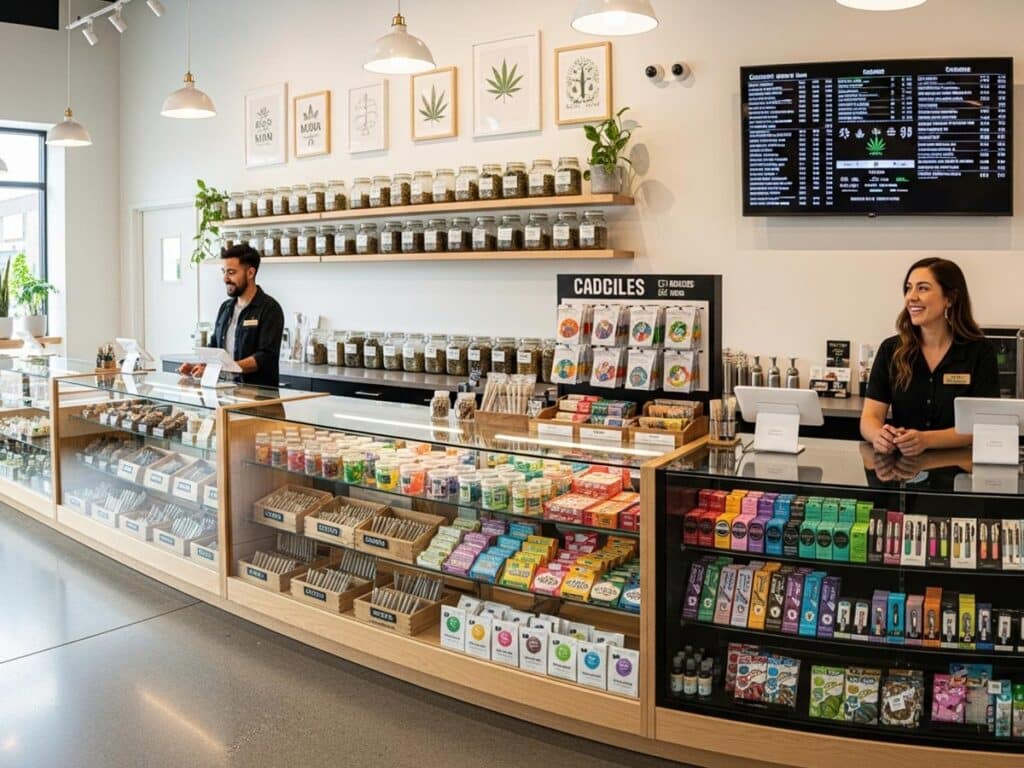
This snapshot from Wikipedia shows just how diverse the modern cannabis market has become. It’s no longer just about dried buds; dispensaries offer a whole world of cannabis-infused goods.
Nearly everything you’ll find on a menu falls into one of four main buckets. Master these, and you’ll be able to order like a pro.
The Main Product Categories
- Flower: This is what most people picture: the dried, cured buds of the cannabis plant. It’s the most traditional form and can be smoked or vaporized for near-instant effects. Practical tip: Choosing a flower strain is like picking a coffee blend; each has a unique aroma, flavor, and effect. Ask your budtender for a “sativa” for energy or an “indica” for relaxation.
- Edibles: From gummies and chocolates to infused drinks, these are food products containing cannabis. They are famous for their potent, long-lasting effects because your digestive system breaks them down. Actionable insight: The golden rule with edibles is to “start low and go slow.” Effects can take 30 minutes to two hours to kick in. A beginner dose is typically 2.5-5mg of THC.
- Concentrates: Just as the name suggests, these are highly concentrated forms of cannabis, like oils, waxes, and shatter. They are far more potent than flower and are typically vaporized (“dabbed”). Who it’s for: Concentrates are generally best for experienced users seeking powerful, fast-acting effects.
- Topicals: This category includes creams, balms, and lotions infused with cannabis that you apply directly to your skin. Topicals are a fantastic choice for localized relief from issues like sore muscles or joint pain. The key benefit: They do not produce any intoxicating “high,” making them a perfect way to explore the wellness benefits of cannabis without psychoactive effects.
“Dispensaries are the front-line retail venues supporting a massive market surge by offering regulated access to these products.”
This incredible product variety is a key driver of the legal cannabis boom. The global market is projected to leap from nearly $51 billion in 2024 to around $64 billion in 2025. You can dig into the data on the growth of the cannabis products market to see how dispensaries are fueling this trend.
Ultimately, the right product for you will depend on its active compounds, primarily THC (for psychoactive effects) and CBD (for non-intoxicating therapeutic benefits). To master the differences, check out our detailed guide on CBD vs THC.
Understanding Dispensary Laws and Regulations
Ever walked into a dispensary and wondered why the security feels more like a bank than a typical retail store? There’s a good reason. The cannabis industry operates in a complex legal landscape, and understanding this is key to appreciating the dispensary experience.
The core issue is a major disconnect between federal and state laws in the U.S. While your state may have legalized cannabis for medical or recreational use, the federal government still classifies it as a Schedule I controlled substance. This forces the entire industry to navigate a tricky legal tightrope every day.
The Clash Between Federal and State Laws
So, what does this conflict mean for you and the dispensary? It means that even a fully legal business operating under state law is technically violating federal law. This is precisely why licensed dispensaries are so meticulous about following every single state rule—it’s how they protect their business, their staff, and their customers.
This federal-state divide is also why you can’t transport cannabis products across state lines, even between two states where cannabis is legal. The moment you cross that border, you enter federal jurisdiction, and your legal products can become illegal contraband.
This legal friction is a defining feature of the cannabis industry. As Wikipedia’s overview of cannabis legality in the U.S. explains, the federal government has mostly deferred to state laws, but the fundamental conflict remains unresolved.
How State Regulations Keep You Safe
To create a legitimate and safe market, states with legal cannabis have implemented some of the most stringent retail regulations in any industry. These rules govern every aspect of a dispensary’s operations, all designed to protect you, the consumer.
Here’s what state oversight guarantees:
- Rigorous Licensing: Opening a dispensary involves an incredibly stringent application and vetting process.
- Mandatory Product Testing: Every product on the shelf must be tested by a third-party lab to verify its potency and screen for contaminants like pesticides, mold, and heavy metals.
- Seed-to-Sale Tracking: States use sophisticated systems to track every cannabis plant from cultivation to final sale. This prevents legally grown products from being diverted to the illicit market.
- Purchase Limits: States set clear caps on how much an individual can buy in a single day or transaction.
These regulations are precisely why buying from a licensed dispensary is the safest and smartest choice. You get a product that is tested, accurately labeled, and sold in a secure, professional environment. The illicit market offers zero of these guarantees.
How to Prepare for Your First Dispensary Visit
Feeling a little nervous before your first dispensary visit is completely normal. But with a little preparation, you can walk in with the confidence of a regular. This practical guide will ensure your first trip is smooth, positive, and successful.
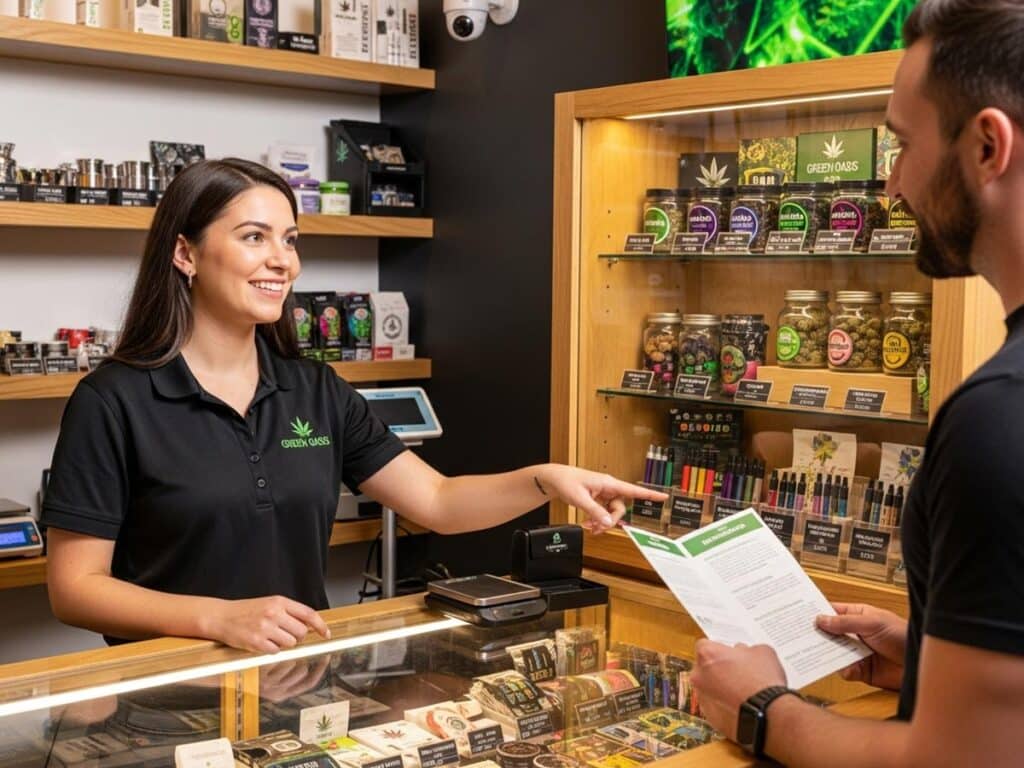
Before you head out, a couple of quick checks will make your experience seamless.
The Essentials: What to Bring and Expect
Dispensaries take legal compliance seriously, so their check-in process is thorough but quick. Having these items ready will make it a breeze.
- Bring a Valid ID: This is non-negotiable. You need a government-issued photo ID (such as a driver’s license or passport) that proves you are 21 or older. For a medical dispensary, you will also need your state-issued medical cannabis card.
- Have Cash Ready: This is a crucial tip. Because cannabis remains federally illegal, most dispensaries cannot process credit card transactions. The vast majority are cash-only. While many have an on-site ATM, bringing cash with you is the best way to avoid extra fees and ensure a smooth checkout.
Once you’re checked in, you’ll enter the main sales floor and meet your guide.
Meeting Your Budtender: Your Personal Guide
Think of your budtender as a cannabis sommelier. Their job is to listen to your goals, understand your experience level, and guide you to the perfect product. A great budtender is an expert resource, not a salesperson. Never feel shy about asking questions—they are there to help.
Open communication is key. Research shows that many patients hesitate to discuss cannabis with their doctors. A budtender helps bridge this gap by providing product-specific knowledge in a comfortable, judgment-free setting.
To get the most out of your conversation, come prepared with a goal in mind. The more specific you can be, the better your budtender can tailor their recommendations.
Smart Questions to Ask Your Budtender
Instead of a vague request like, “I want to relax,” give your budtender more context. This helps them provide a truly personalized suggestion.
Try framing your questions like this for actionable advice:
- “I’m looking for something to help me unwind after work without feeling too sleepy. What would you recommend?” This clearly states your desired effect (relaxation) and a crucial constraint (no “couch-lock”).
- “I’m new to edibles and a little nervous. What’s a good product and starting dose for a complete beginner?” This immediately conveys your experience level and a specific concern, allowing them to suggest a low-dose gummy (e.g., 5mg).
- “I need help with localized muscle soreness after the gym. Do you have a topical you’d recommend that won’t make me feel high?” This targets a specific need (pain relief) and a critical requirement (no psychoactive effects).
With these simple steps, you can turn a potentially intimidating visit into an empowering and educational experience, ensuring you walk out with a product you’ll love.
How to Choose the Right Dispensary for You
With more and more dispensaries opening, how do you choose the right one? Finding a trustworthy shop is the secret to a consistently great experience. It’s about more than just proximity; it’s about finding a reliable partner for your cannabis journey.
Think of it like choosing a new pharmacy or a favorite restaurant—a little upfront research pays off.
Start your search online. Websites like Leafly and Weedmaps are invaluable tools. You can browse menus, check inventory, compare prices, and, most importantly, read customer reviews to see what real people are saying.
What to Look For
When comparing dispensaries, a few key factors separate the great from the mediocre. Focus on these to make a smart choice.
- Product Quality and Lab Testing: A reputable dispensary is transparent about its products. Look for shops that make lab test results easily accessible, often via a QR code on the packaging. This is your proof that the product is clean, safe, and has the advertised potency.
- Staff Knowledge and Atmosphere: The best budtenders are passionate, knowledgeable, and great listeners. They should make you feel comfortable asking any question. The shop’s vibe also matters—it should feel clean, professional, and welcoming.
- Pricing and Loyalty Programs: No one wants to overpay. Compare prices on a few key products between different dispensaries. Actionable tip: Always ask about loyalty programs or daily deals. These can lead to significant savings over time.
A great dispensary is more than a store; it’s a trusted resource. Finding one you feel good about ensures you get safe products and expert advice every time you visit.
Think practically: if you rely on a specific product for sleep, you need a dispensary that consistently stocks it or has staff who can recommend a reliable alternative. If your schedule is unpredictable, finding a quality dispensary near me that is open 24 hours can be a game-changer.
Taking a few minutes to vet your options ensures every visit is a positive one.
Common Questions About Dispensaries
Even with the basics covered, a few practical questions often pop up before a first visit. Let’s tackle the most common ones so you can walk in with total confidence.
Do I Need a Special Card to Get In?
This is the most frequent question, and the answer is straightforward: it depends on the type of dispensary.
- For a recreational dispensary, you need a valid government-issued photo ID (like a driver’s license or passport) proving you are 21 or older. That’s it.
- For a medical dispensary, you absolutely need a state-issued medical cannabis card or an official doctor’s recommendation to enter.
Can I Use My Credit Card?
Most likely, no. Because cannabis is still federally illegal, major banks and credit card companies avoid processing these transactions. This means the majority of dispensaries are cash-only businesses.
Don’t let that deter you. Almost every dispensary has an ATM on-site for your convenience. Some may also offer debit card payments or third-party apps, but bringing cash is always your safest bet.
Is the Stuff from a Legal Dispensary Actually Safe?
Yes, absolutely. In fact, safety is the single most important reason to purchase exclusively from licensed, legal dispensaries. State regulations mandate that every product sold must undergo rigorous third-party lab testing.
“A lot of patients believe that there’s a more ‘natural way’ to manage symptoms… [many] thought it was helping to treat their cancer.”
These lab reports confirm the product’s potency (the exact amount of THC, CBD, etc.) and screen for a comprehensive list of contaminants, including pesticides, mold, heavy metals, and solvents. This process guarantees you are getting a product that is clean, safe, and accurately labeled every time.
To be an informed consumer, understanding when weed is laced is smart. The regulated market provides a powerful safety net against such risks—a guarantee you will never get from the illicit market.
At Elevation Headquarters, we pride ourselves on creating a safe, welcoming space where you can explore a wide selection of lab-tested cannabis products. You can browse our menu online or come see us at our New York location today. Find out more at https://elevationhqnyc.com/store/.

